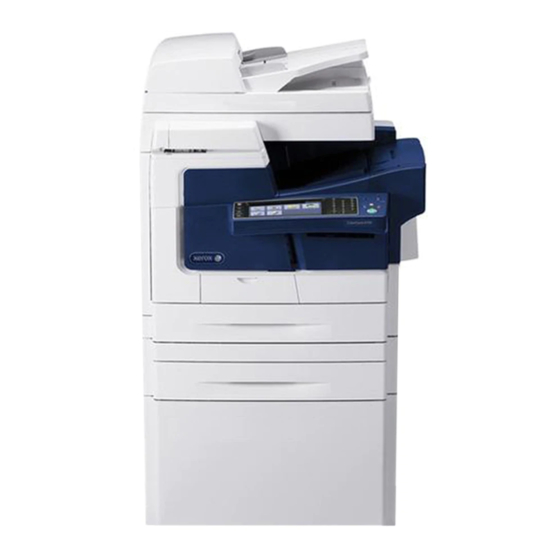6. Caution: The machine allows an authenticated System Administrator to disable functions like Image Overwrite Security that are
necessary for secure operation. System Administrators are advised to periodically review the configuration of all installed
machines in their environment to verify that the proper evaluated configuration is maintained.
7. Depending upon the configuration of the device, two IPv4 addresses, a primary IPv4 address and a secondary IPv4 address,
may be utilized. The System Administrator selects whether the primary IPv4 address will be obtained statically or dynamically
via DHCP from the IP (Internet Protocol) page on the Web UI
System Administrator enables the 'Self Assigned Address' option from the IP (Internet Protocol) page on the Web UI. If the
'Self Assigned Address' option is enabled (which is the default case), this secondary IPv4 address will not be visible to the SA
The 'Self Assigned Address' option from the Web UI IP (Internet Protocol) page should be disabled unless either APIPA is used
or Apple Rendezvous/Bonjour support is required.
8. If a system interruption such as power loss occurs a job in process may not be fully written to the hard disk drive(s). In that case
any temporary data created will be overwritten during job recovery but a corresponding record for the job may not be recorded
in the completed job log or audit log.
9. If IPv6 is disabled and then a software upgrade is performed by a Xerox Service Technician using an AltBoot, IPv6 will be
disabled even though both the Local UI and Web UI show that IPv6 is enabled. IPv6 can be enabled again via the Web UI by
first disabling and then re-enabling it.
10. A unique Scan-to-Mailbox mailbox should be established for each authenticated user.
11. Remote Polling should only be used by the System Administrator.
12. Printing of Embedded Fax confirmation reports is not included in the evaluation. The Embedded Fax cover sheets should not be
printed with an Embedded Fax job.
13. Users should be aware that correct remote repository document pathnames for the receipt of workflow scanning jobs should
start with one '\' as opposed to the two '\'s shown in the SAG (e.g., page 140).
14. Users should be provided with appropriate training on how to use the machine in a secure manner before being assigned user
accounts to access the device.
15. The following windows are available to any authenticated and authorized user from the Local User Interface. These windows
provide standard machine services or job management capability:
Embedded Fax Batch Send Confirmation – Allows a user to either send an Embedded Fax job to a remote destination
•
immediately or include the job as part of a "batch" of Embedded Fax jobs sent to the same destination. Is accessible by
selecting the following screens/buttons in order: [Services Home] hard button
button when a user is submitting an Embedded Fax Send job to the same destination as a previously submitted "delayed
send" Embedded Fax job.
Releasing All Secure Receive Jobs – An authenticated user with the secure receive passcode number can release all
•
received Embedded Faxes as follows:
•
At the control panel, press Job Status button.
From the Active Jobs tab touch any one of the incoming received Embedded Fax listed.
•
Touch the [Release All] button .
•
•
Use the keypad to enter the secure receive passcode number and then touch the [Enter] button.
•
Pausing an active job being processed by the device – Allows the user to pause an active copy, print, workflow scanning,
scan to email, Internet Fax or Embedded Fax job while it is being processed. Is accessible by selecting the [Stop] machine
hard button while a job is being processed by the device. Depending on the type of jobs being processed by the device when
the [Stop] button is selected, one of the following Pause windows will be displayed as appropriate to allow the user to
determine whether to delete or continue processing of the job: Scanning Pause window, Printing Pause window, Copy Only
(Scanning and Printing) Pause window, Scanning/Printing (Simultaneous Jobs) Pause window, Scanning Build Job
Segment (No Printing) Pause window, Printing Build Job Segment (No Scanning) Pause window or Scanning Build Job
Segment/Printing Another Job Pause window.
•
Overwrite Security Failure – Automatically provides an error message to the user is case an Immediate Image Overwrite of
a copy, print, workflow scanning, scan to email, LAN Fax or Embedded Fax job fails. The error message informs the user to
notify the System Administrator that an On Demand Overwrite should be run and persists on the Local UI screen until either
a manual or a scheduled On Demand Overwrite is initiated.
9
The primary IPv4 address can also be assigned dynamically via DHCP from the Dynamic Addressing screen on the Local UI.
10
The primary IPv4 address will always be displayed on the Configuration Report.
9
. The second IPv4 address is assigned via APIPA when the
[Fax] feature button
10
.
[Start] hard
7

